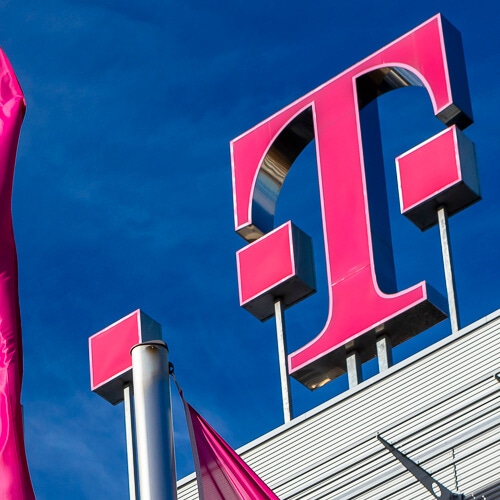
Deutsche Telekom (DT) is again raising its guidance for 2021 after its businesses performed "even better than expected" in the year to date, according to group CEO Timotheus Höttges.
"Following strong figures in the first nine months, we are setting the bar for 2021 a little higher," Höttges said.
DT now expects to report adjusted earnings before interest, taxes, depreciation, and amortization after leases (EBITDAal) of about €38 billion (US$43.5 billion), up from the previous guidance of at least €37.2 billion ($42.6 billion).
Figure 1:  Flying the flag: Germany-based group hails 'better than expected' performance in the first nine months of the year.
Flying the flag: Germany-based group hails 'better than expected' performance in the first nine months of the year.
(Source: Deutsche Telekom)
DT noted that both T-Mobile US and the group's business outside the United States contribute to the raised guidance. In the United States, adjusted EBITDAal of around $26.5 billion is now expected, up from $26.1 billion previously.
Outside the United States, adjusted EBITDAal is now forecast at €14.6 billion ($16.7 billion), up from the previous guidance of €14.4 billion ($16.5 billion).
DT further pointed out that it began the 2021 financial year with a forecast for adjusted EBITDAal of around €37 billion ($42 billion) compared to €35 billion ($40 billion) a year previously. In addition, free cash flow after leases is now expected to total around €8.5 billion ($9.7 billion), up from the previous forecast of at least €8 billion ($9.2 billion).
DT is now envisaging a higher dividend of €0.64 ($0.73) per share for 2021, up from €0.60 for the 2020 financial year.
T-Mobile in rude health
In the third quarter (Q3) of 2021, DT's group net revenue grew by 2.1% in organic terms to €26.9 billion ($30 billion). Adjusted EBITDAal increased by 0.2% in organic terms to €9.7 billion ($11 billion).
In the three-month period, net profit reached €0.9 billion ($1 billion), up 8.% year on year. Adjusted for special factors, net profit decreased by 13% in Q3 to €1.3 billion ($1.5 billion).
DT particularly highlighted the fact that T-Mobile US recorded another quarter of strong customer growth. Here, the number of postpaid customers grew by 1.3 million between July and September, to reach a total base of 106.9 million customers.
Total US revenue increased by 2.3% in Q3 to $19.8 billion. Adjusted EBITDAal declined by 2.9% to $6.8 billion. T-Mobile US also raised the target for synergies from the business combination with Sprint for 2021 from between $2.9 billion and $3.2 billion to between $3.2 billion and $3.5 billion.
During DT's analyst earnings call, Höttges argued that the merger between T-Mobile US and Sprint had already proved it was the right thing to do.
"Since we have merged our activities, there is a super activity of building infrastructure. So the opposite of what everybody was expecting," he said.
"It's better for the consumers and it's better for the country that we have consolidated. Otherwise we would never have been in the position to catch up to AT&T and Verizon in this environment."
Lebara effect
In DT's domestic market of Germany, revenue increased 2.5% year-on-year to €6 billion ($6.87 billion) and adjusted EBITDAal grew by 3.9% to €2.5 billion ($2.86 billion).
The number of broadband customers increased by 90,000 between July and September. DT said more than 70% or over 10 million of Telekom's broadband customers now use fiber-optic-based products (including vectoring), while almost four million customers are now using the television service MagentaTV.
DT's CFO Christian Illek nevertheless noted that the loss of Lebara as a wholesale customer to Telefónica Deutschland (O2 Germany) will have an adverse effect on EBITDA.
"The Lebara effect is a middle double-digit service revenue and EBITDA figure, which is going to come as a headwind … we have a guidance of 2.5% to 3% for Germany out there," he said.
Want to know more about 5G? Check out our dedicated 5G content channel here on
Light Reading.
"We are happy with the guidance. If we're better obviously we will report better figures ... but 3.8% [organic EBITDAal growth], which you have now seen for two quarters in a row [Q1 and Q2 2021], has to be basically adjusted for certain effects and Lebara is the biggest one when it comes to EBITDA contribution.”
DT also commented on when it planned to roll out a standalone 5G network in Germany, indicating that it is on track but deployment will depend on handset availability and other factors.
A further bright note is that DT's problem child, T-Systems, appears to have shown some signs of improvement in Q3.
Order entry grew by 15.1% to €0.8 billion ($0.9 billion) and revenue increased 1.7% to €1 billion ($1.14 billion). Adjusted EBITDAal also reached €80 million ($91.5 million) in Q3 – 3.9% more than a year previously.
Related posts:
— Anne Morris, contributing editor, special to Light Reading
Read more about:
EuropeAbout the Author(s)
You May Also Like












